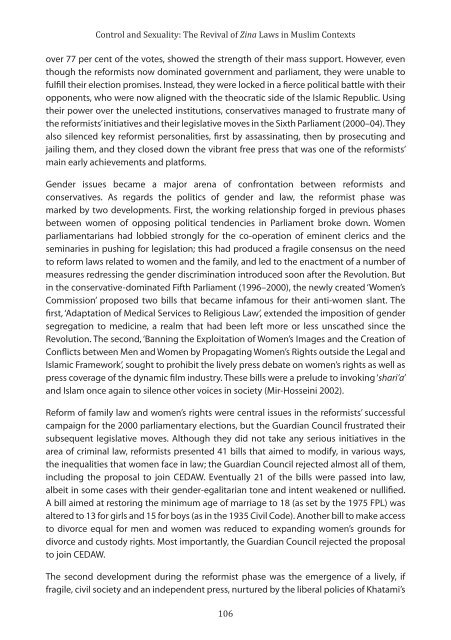control and sexuality
control and sexuality
control and sexuality
- No tags were found...
Create successful ePaper yourself
Turn your PDF publications into a flip-book with our unique Google optimized e-Paper software.
Control <strong>and</strong> Sexuality: The Revival of Zina Laws in Muslim Contextsover 77 per cent of the votes, showed the strength of their mass support. However, eventhough the reformists now dominated government <strong>and</strong> parliament, they were unable tofulfill their election promises. Instead, they were locked in a fierce political battle with theiropponents, who were now aligned with the theocratic side of the Islamic Republic. Usingtheir power over the unelected institutions, conservatives managed to frustrate many ofthe reformists’ initiatives <strong>and</strong> their legislative moves in the Sixth Parliament (2000–04). Theyalso silenced key reformist personalities, first by assassinating, then by prosecuting <strong>and</strong>jailing them, <strong>and</strong> they closed down the vibrant free press that was one of the reformists’main early achievements <strong>and</strong> platforms.Gender issues became a major arena of confrontation between reformists <strong>and</strong>conservatives. As regards the politics of gender <strong>and</strong> law, the reformist phase wasmarked by two developments. First, the working relationship forged in previous phasesbetween women of opposing political tendencies in Parliament broke down. Womenparliamentarians had lobbied strongly for the co-operation of eminent clerics <strong>and</strong> theseminaries in pushing for legislation; this had produced a fragile consensus on the needto reform laws related to women <strong>and</strong> the family, <strong>and</strong> led to the enactment of a number ofmeasures redressing the gender discrimination introduced soon after the Revolution. Butin the conservative-dominated Fifth Parliament (1996–2000), the newly created ‘Women’sCommission’ proposed two bills that became infamous for their anti-women slant. Thefirst, ‘Adaptation of Medical Services to Religious Law’, extended the imposition of gendersegregation to medicine, a realm that had been left more or less unscathed since theRevolution. The second, ‘Banning the Exploitation of Women’s Images <strong>and</strong> the Creation ofConflicts between Men <strong>and</strong> Women by Propagating Women’s Rights outside the Legal <strong>and</strong>Islamic Framework’, sought to prohibit the lively press debate on women’s rights as well aspress coverage of the dynamic film industry. These bills were a prelude to invoking ‘shari’a’<strong>and</strong> Islam once again to silence other voices in society (Mir-Hosseini 2002).Reform of family law <strong>and</strong> women’s rights were central issues in the reformists’ successfulcampaign for the 2000 parliamentary elections, but the Guardian Council frustrated theirsubsequent legislative moves. Although they did not take any serious initiatives in thearea of criminal law, reformists presented 41 bills that aimed to modify, in various ways,the inequalities that women face in law; the Guardian Council rejected almost all of them,including the proposal to join CEDAW. Eventually 21 of the bills were passed into law,albeit in some cases with their gender-egalitarian tone <strong>and</strong> intent weakened or nullified.A bill aimed at restoring the minimum age of marriage to 18 (as set by the 1975 FPL) wasaltered to 13 for girls <strong>and</strong> 15 for boys (as in the 1935 Civil Code). Another bill to make accessto divorce equal for men <strong>and</strong> women was reduced to exp<strong>and</strong>ing women’s grounds fordivorce <strong>and</strong> custody rights. Most importantly, the Guardian Council rejected the proposalto join CEDAW.The second development during the reformist phase was the emergence of a lively, iffragile, civil society <strong>and</strong> an independent press, nurtured by the liberal policies of Khatami’s106


